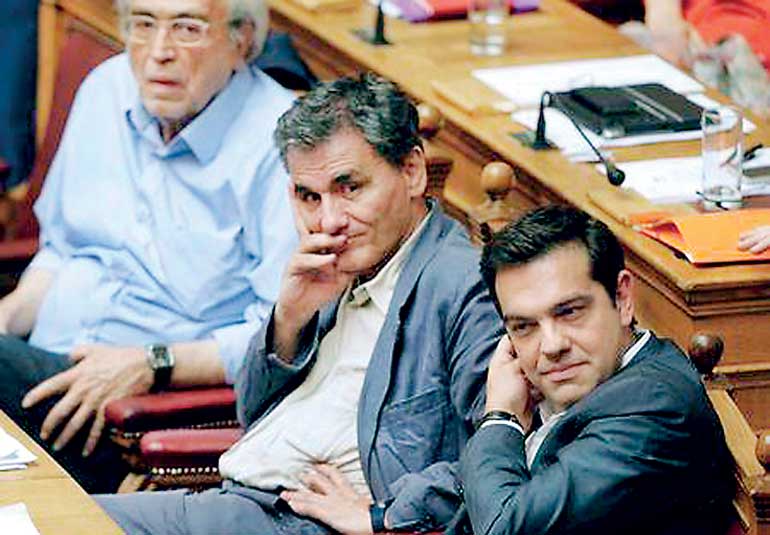Wednesday Feb 25, 2026
Wednesday Feb 25, 2026
Friday, 17 July 2015 00:00 - - {{hitsCtrl.values.hits}}

Greek Prime Minister Alexis Tsipras (R) sits next to Finance Minister Euclid Tsakalotos (C) during a parliamentary session in Athens, Greece – REUTERS
The Greek parliament passed sweeping austerity measures demanded by lenders to open talks on a new multibillion-euro bailout package to keep Greece in the euro, but dozens of hardliners in the ruling Syriza party deserted Prime Minister Alexis Tsipras.
The package was approved with 229 votes in the 300-seat chamber. There were 64 votes against it and six abstentions. But Tsipras required the support of pro-European opposition parties to push the measure through, leaving a question over the future of his government.
Tsipras said there was no alternative to the package, which he acknowledged would cause hardship, but he stood by the decision. “I am the last person to shirk this responsibility,” he said.
In exchange for funding worth up to 86 billion euros, Greece has accepted reforms including significant pension adjustments, increases to value added tax, an overhaul of its collective bargaining system, measures to liberalise its economy and tight limits on public spending.
It has also agreed to sequester 50 billion euros of public assets in a special privatisation fund to act as collateral on the deal.
The measures were branded ‘social genocide’ by the firebrand speaker of parliament Zoe Constantopoulou, one of 38 Syriza lawmakers to oppose the package, and there were violent clashes between protesters and police outside parliament as the debate went on before the vote.
Among the Syriza rebels was former Finance Minister Yanis Varoufakis, who was sacked by Tsipras last week and who denounced the bailout deal as ‘a new Versailles Treaty’ – the agreement that demanded unaffordable reparations from Germany after its defeat in World War One.
Energy Minister Panagiotis Lafazanis and Deputy Labour Minister Dimitris Stratoulis also voted against the package.
Amid speculation that both ministers could lose their jobs in a reshuffle, possibly as early as Thursday, Lafazanis said he remained loyal to the government but was ready to offer his resignation, joining Deputy Finance Minister Nadia Valavani, who stepped down earlier on Wednesday.
“We support Syriza in government and we support the Prime Minister. We don’t support the bailout,” he said after the vote.
Elected in January on an anti-austerity platform, Tsipras made an about-turn following gruelling all-night negotiations in Brussels on Monday, giving in to lenders’ demands for immediate reforms to prevent a chaotic exit from the single currency.
Speaking in parliament before the vote, Tsipras made clear he was supporting the package against his will but there was no alternative if Greece was to avoid financial collapse.
“I acknowledge the fiscal measures are harsh, that they won’t benefit the Greek economy, but I’m forced to accept them,” he said as he made a final appeal for support.
A new Versailles treaty
With Greek parliamentary approval secured, the way has been cleared for other national parliaments to approve the start of bailout talks and for the release of funding to allow Greek banks to re-open, more than two weeks after capital controls were imposed to prevent them from collapsing.
Eurozone finance ministers are due to hold a conference call on Thursday at 10 a.m. (0800 GMT) to discuss the vote.
With Greece facing an urgent deadline on 20 July, when a 3.5 billion euro payment to the European Central Bank is due, EU officials raced to agree a bridge financing accord that would enable Athens to avoid defaulting on the loan.